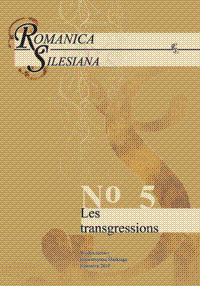Transgressive Shame / Transgressing Shame. Reflections on Lorna Crozier’s Poetic Revision of the Christian Myth of the Fall
Transgressive Shame / Transgressing Shame. Reflections on Lorna Crozier’s Poetic Revision of the Christian Myth of the Fall
Author(s): Zuzanna SzatanikSubject(s): Language and Literature Studies
Published by: Wydawnictwo Uniwersytetu Śląskiego
Keywords: Transgression; shame; feminist theory; queer theory; Lorna Crozier
Summary/Abstract: The general aim of this paper is to analyse the ways in which the concept of “transgression” loses its negative connotations in queer and feminist interpretations of the Biblical narrative of the Original Sin. In the course of this analysis, “transgression” ceases to be the indication of evil and sin, and starts to represent the possibility of transformation, redefinition, and rebellion. The theoretical part of the article focuses on the feminist reading of the Biblical Creation Myth and ponders the meaning of shame experienced by Adam and Eve in the aftermath of their sin. It also indicates the parallels between the concepts of “shame” and “queerness,” which comparison, in turn, allows for a redefinition of the notion of “transgression.” The subsequent part of the text constitutes an interpretation of Lorna Crozier’s poem titled “Original Sin.” In her revision Crozier subverts the binary logic of the Garden by means of evoking the character of Lilith as well as Aristophanes’ myth of the origins of human kind. The purpose of the proposed reading is to show that through queering the Biblical story, Crozier de-shames the Biblical Eve, and undermines the Biblical depiction of her sin. The last part of the paper focuses on an analysis of Crozier’s poem “What I Gave You Truly” in which Eve’s confession becomes the narrative of transgression.
Journal: Romanica Silesiana
- Issue Year: 2010
- Issue No: 5
- Page Range: 235-252
- Page Count: 18
- Language: English

